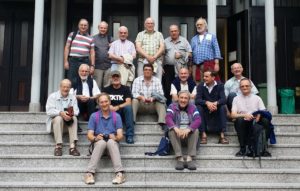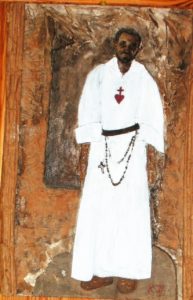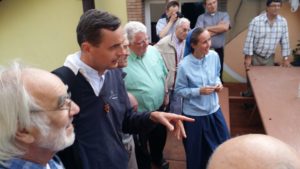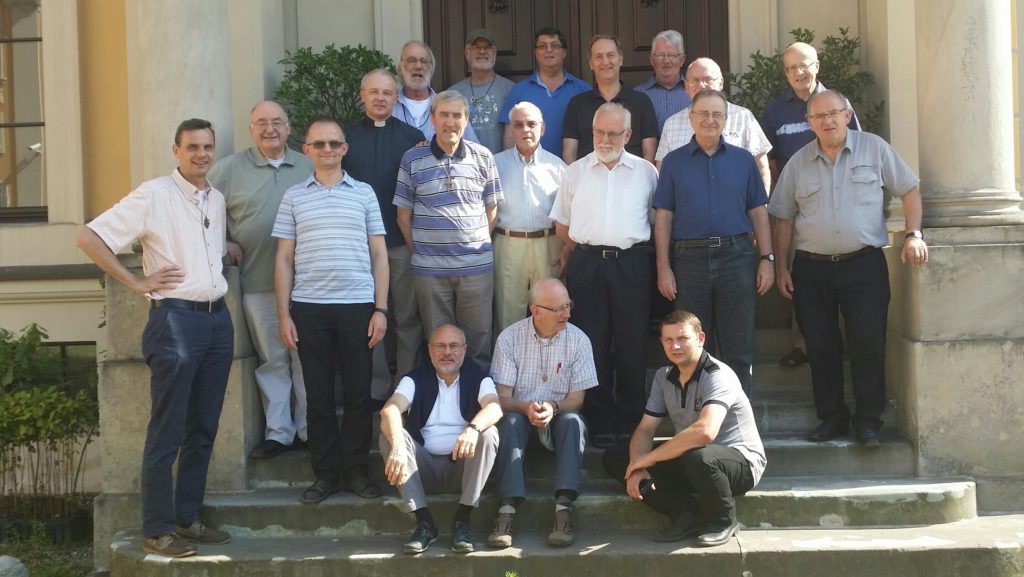LETTER FROM RUDY, MESSAGE OF THE JESUS CARITAS PRIESTS’ FRATERNITY FROM THE EUROPEAN ASSEMBLY OF RUDY,
Poland, from 12 to 19 July 2017.
“Czes’c” (pronounced “Chech’tch”): by this Polish greeting we come to meet with you, fraternities of Europe, and send  you this message, fruit of our work but also of our prayer. Thanks to our caring hosts and to the meetings they organized for us in various parishes, we have come closer to the realities of their country and of their Church and have let the theme of our assembly echo around: “Diocesan priests and missionaries, inspired by the testimony of Charles de Foucauld. “
you this message, fruit of our work but also of our prayer. Thanks to our caring hosts and to the meetings they organized for us in various parishes, we have come closer to the realities of their country and of their Church and have let the theme of our assembly echo around: “Diocesan priests and missionaries, inspired by the testimony of Charles de Foucauld. “
IN THE EUROPEAN CONTEXT OF SECULARIZATION
The gospel of the second day of the assembly, offered by the liturgy, sets the tone of our message: “Behold, I send you as sheep among wolves … be cunning as serpents and innocent as doves … (Mt 10,16)
Each of our countries, at various speeds, observes the phenomenon of secularization: a reduction in church attendance, evolutions of mentioned values, civil laws distancing themselves from the Christian tradition … In a nutshell religion is not popular. Communities and priests are engaged in this movement and must make a decision: accept or refuse it? Compromise or compromise themselves? The status of the priest suffers from this: a modified identity, a diminished social standing, a lesser authority … One can understand why young people are hesitant to embark on such an insecure path and to commit for the long term.
As members of the Jesus Caritas Fraternity we are not spared by this secularization, which taints our way of life and our mission; the question is: how to transmit a tradition, a Word in this secularized day? Charles de Foucauld went far away; but today the mission begins at the front door of our neighbour.
The cunning of the serpent and the Innocence of the dove are necessary to carry out the mission and to make one’s way through listening, study and work: “to make a dictionary”. To take into account the actual culture demands time and we do not have not much time.
DIOCESAN PRIESTS IN A MISSIONARY CHURCH
 Our exchanges have shown that in most of our countries the development of secularization, consumerism and individualism made evangelisation both difficult and necessary and that many initiatives were appearing to give back its rightful place to the Word of God, to a more fraternal parish life and to the care of the “peripheries”. Recognizing and promoting the role of the laity in evangelization is a necessity.
Our exchanges have shown that in most of our countries the development of secularization, consumerism and individualism made evangelisation both difficult and necessary and that many initiatives were appearing to give back its rightful place to the Word of God, to a more fraternal parish life and to the care of the “peripheries”. Recognizing and promoting the role of the laity in evangelization is a necessity.
In some dioceses, the bishops have encouraged the formation of groups whose first task is to promote the training of the baptized by deepening their understanding of the faith and their spiritual life. In the long run, these evangelisation groups will be able to focus on the aim of reaching a larger community, especially those of other faiths, not primarily to convert them but to promote mutual understanding and acceptance, as well as to communicate the joy of the Gospel.
 As a result of the lack of priests, priests from Africa and India come to many of our dioceses to work for evangelization. With good support to help them understand the culture that welcomes them, their presence can be a great blessing for the Church, in places where the congregations are already multicultural.
As a result of the lack of priests, priests from Africa and India come to many of our dioceses to work for evangelization. With good support to help them understand the culture that welcomes them, their presence can be a great blessing for the Church, in places where the congregations are already multicultural.
This lack of priests also leads to the regrouping of parishes, which offers the laity the opportunity to take greater responsibilities in the field of evangelization as well as in the various services. But an effort has to be made to better identify the talents of one and all and to know how best to value them.
Many successful paths have been taken with young people in the dioceses, such as the World Youth Day or other initiatives. It is undoubtedly worthwhile to devote energy and time to the formation of young people, helping them to find ways to resist the pressure of consumerism. But this must not make us forget the need to train adults and give them more autonomy.
 We are always aware that evangelization does not occur first in our churches but in public places. Examples have been shared of initiatives in shopping malls or other public places, seeking to reach a wider audience. The various interventions of our assembly have developed the conviction that priests need to give a sense of responsibility to the lay faithful in the work of evangelization, to accompany them and to collaborate with them. In the same way, priests and lay people evangelize more effectively when the joy of the Gospel shows through in their own lives.
We are always aware that evangelization does not occur first in our churches but in public places. Examples have been shared of initiatives in shopping malls or other public places, seeking to reach a wider audience. The various interventions of our assembly have developed the conviction that priests need to give a sense of responsibility to the lay faithful in the work of evangelization, to accompany them and to collaborate with them. In the same way, priests and lay people evangelize more effectively when the joy of the Gospel shows through in their own lives.
INSPIRED BY THE TESTIMONY OF BROTHER CHARLES
The evangelical radicalism of Charles de Foucauld, drawn from contemplative prayer and adoration, his choice of poverty and his desire to be like Jesus in Nazareth, put us in front of the “weakness of God ” and lead us to the cast off all pastoral pretensions.
The testimony of Fr. Charles helps us to be priests
– who learn to go back to the Gospel to fill themselves with the spirit of Jesus
– who choose the simple life going as far as poverty to first show the “work” of the grain of wheat fallen to the ground (cf Jn 12:24): the true success of God is revealed in His utter poverty. Hence the invitation to go to “existential peripheries”, to show solidarity with the poor, to get closer to the humble and the crucified in History. Universal brotherhood has its root in obedience to God the Father and to the poor brethren who reveal Jesus to us; the poor is a true “theological place” of the closeness of God and leads to adoration.
 – who learn to listen: first to Jesus who speaks to us in the Gospel, in the Eucharist and in the silence of the desert, but also to every man, in order to be evangelized by the encounter of a humanity already marked by the presence of the Spirit. We can be converted in this sense by the icon of the Visitation. Listening to others and their lives requires patience in the reciprocal gift of a human and friendly presence. The time given to listening and to the friendly meeting is an important and precious time to clear the ground before sowing the seed of the Gospel. With such an attitude we can play, now and in the future, a significant role in meeting and having a dialogue with our Muslim brothers, who are present in most of our countries.
– who learn to listen: first to Jesus who speaks to us in the Gospel, in the Eucharist and in the silence of the desert, but also to every man, in order to be evangelized by the encounter of a humanity already marked by the presence of the Spirit. We can be converted in this sense by the icon of the Visitation. Listening to others and their lives requires patience in the reciprocal gift of a human and friendly presence. The time given to listening and to the friendly meeting is an important and precious time to clear the ground before sowing the seed of the Gospel. With such an attitude we can play, now and in the future, a significant role in meeting and having a dialogue with our Muslim brothers, who are present in most of our countries.
– who undertake to live a priestly fraternity as a providential place to discover the will of God (revision of life) and to help them live a discreet apostolate, stripped of all external means, trusting entirely in Jesus; and to welcome the last place, the one Jesus would have chosen.
FACED WITH THE RARITY OF VOCATIONS
 In the majority of our European countries, the decline in the number of candidates to the priesthood is very important. The general context of secularization explains it, as well as a culture of immediacy: freedom without commitment, autonomy without responsibility, lack of silence. We notice, however, that many young people show great acts of generosity.
In the majority of our European countries, the decline in the number of candidates to the priesthood is very important. The general context of secularization explains it, as well as a culture of immediacy: freedom without commitment, autonomy without responsibility, lack of silence. We notice, however, that many young people show great acts of generosity.
Our response to encouraging the welcomed acceptance of the call of God is through the testimony of our own life as a priest: what place does it give to silence, to the desert? Does it know how to keep in touch with the young to listen and accompany them?
Communities that truly live from the presence of the Risen Lord are the best ground for vocations and the example of the Blessed Charles de Foucauld, whose life was fruitful in the long term, is an encouragement.
CALLS FOR A SIMPLE LIFE
The encyclical of Pope Francis Laudato si needs to be implemented. Faced with the temptation to consume and accumulate, an education to learn to share remains to be done. To show solidarity, you must be sober! For us priests, it is a question of leading a life not poor, but simple, which will make us accessible to all. Laudato si invites us to a “happy sobriety” and encourages the good actions: recycling; sorting; saving water, energy and raw materials; favouring public transport; investing in fair trade … But the encyclical seeks most of all to promote “integral ecology”, which gives priority to the interests of the “common house”. In this sense, the current crisis of caring for refugees challenges us and cannot leave us inactive.
Our European Assembly also had the responsibility to elect a new Responsible for 6 years: Kuno KOHN, from Hamburg, Germany, was elected and accepted the assignment. We want to thank him, as well as John McEVOY (of Ireland) who held this responsibility for the past 6 years. Our next Assembly, in 2020, will be held in England.



